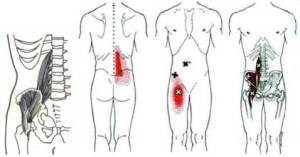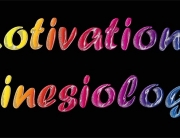an extract from an article by
The Psoas muscle (pronounced so-as) is the deepest muscle of the human body affecting our structural balance, muscular integrity, flexibility, strength, range of motion, joint mobility, and organ functioning. Growing out of both sides of the spine, the psoas spans laterally from the 12th thoracic vertebrae (T12) to each of the 5 lumbar vertebrae.
From there it flows down through the abdominal core, the pelvis, to attach to the top of the femur (thigh) bone. The Psoas is the only ‘muscle’ to connect the spine to the legs. It is responsible for holding us upright, and allows us to lift our legs in order to walk. A healthily functioning psoas stabilizes the spine and provides support through the trunk, forming a shelf for the vital organs of the abdominal core. The psoas is connected to the diaphragm through connective tissue or fascia which affects both our breath and fear reflex. This is because the psoas is directly linked to the reptilian brain, the most ancient interior part of the brain stem and spinal cord. As Liz Koch writes “Long before the spoken word or the organizing capacity of the cortex developed, the reptilian brain, known for its survival instincts, maintained our essential core functioning.” Liz Koch believes that our fast paced modern lifestyle (which runs on the adrenaline of our sympathetic nervous system) chronically triggers and tightens the psoas – making it literally ready to run or fight. The psoas helps you to spring into action – or curl you up into a protective ball. If we constantly contract the psoas to due to stress or tension , the muscle eventually begins to shorten leading to a host of painful conditions including low back pain, sacroiliac pain, sciatica, disc problems, spondylolysis, scoliosis, hip degeneration, knee pain, menstruation pain, infertility, and digestive problems. A tight psoas not only creates structural problems, it constricts the organs, puts pressure on nerves, interferes with the movement of fluids, and impairs diaphragmatic breathing.
 The Psoas muscle (pronounced so-as) is the deepest muscle of the human body affecting our structural balance, muscular integrity, flexibility, strength, range of motion, joint mobility, and organ functioning.
The Psoas muscle (pronounced so-as) is the deepest muscle of the human body affecting our structural balance, muscular integrity, flexibility, strength, range of motion, joint mobility, and organ functioning.
Growing out of both sides of the spine, the psoas spans laterally from the 12th thoracic vertebrae (T12) to each of the 5 lumbar vertebrae. From there it flows down through the abdominal core, the pelvis, to attach to the top of the femur (thigh) bone.
The Psoas is the only ‘muscle’ to connect the spine to the legs. It is responsible for holding us upright, and allows us to lift our legs in order to walk. A healthily functioning psoas stabilizes the spine and provides support through the trunk, forming a shelf for the vital organs of the abdominal core.
The psoas is connected to the diaphragm through connective tissue or fascia which affects both our breath and fear reflex. This is because the psoas is directly linked to the re ptilian brain, the most ancient interior part of the brain stem and spinal cord. As Koch writes “Long before the spoken word or the organizing capacity of the cortex developed, the reptilian brain, known for its survival instincts, maintained our essential core functioning.”
ptilian brain, the most ancient interior part of the brain stem and spinal cord. As Koch writes “Long before the spoken word or the organizing capacity of the cortex developed, the reptilian brain, known for its survival instincts, maintained our essential core functioning.”
Koch believes that our fast paced modern lifestyle (which runs on the adrenaline of our sympathetic nervous system) chronically triggers and tightens the psoas – making it literally ready to run or fight. The psoas helps you to spring into action – or curl you up into a protective ball.
If we constantly contract the psoas to due to stress or tension , the muscle eventually begins to shorten leading to a host of painful conditions including low back pain, sacroiliac pain, sciatica, disc problems, spondylolysis, scoliosis, hip degeneration, knee pain, menstruation pain, infertility, and digestive problems.
 A tight psoas not only creates structural problems, it constricts the organs, puts pressure on nerves, interferes with the movement of fluids, and impairs diaphragmatic breathing.
A tight psoas not only creates structural problems, it constricts the organs, puts pressure on nerves, interferes with the movement of fluids, and impairs diaphragmatic breathing.
In fact, “The psoas is so intimately involved in such basic physical and emotional reactions, that a chronically tightened psoas continually signals your body that you’re in danger, eventually exhausting the adrenal glands and depleting the immune system.”
And according to Koch, this situation is exacerbated by many things in our modern lifestyle, from car seats to constrictive clothing, from chairs to shoes that distort our posture, curtail our natural movements and further constrict our psoas.
In fact, “The psoas is so intimately involved in such basic physical and emotional reactions, that a chronically tightened psoas continually signals your body that you’re in danger, eventually exhausting the adrenal glands and depleting the immune system.” And according to Koch, this situation is exacerbated by many things in our modern lifestyle, from car seats to constrictive clothing, from chairs to shoes that distort our posture, curtail our natural movements and further constrict our psoas.
Motivational Kinesiology has a simple correction for psoas. Being on the kidney meridian it can be influences by fear and anxiety.
See the full article here. http://bodydivineyoga.wordpress.com/2011/03/23/the-psoas-muscle-of-the-soul/






Leave A Comment
You must be logged in to post a comment.